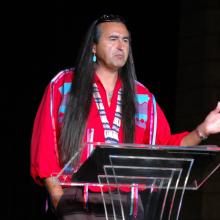Ministry
Bill Gothard, an Illinois-based advocate for home schooling and conservative dress and who warned against rock music and debt, has been placed on administrative leave after allegations of sexually harassing women who worked at his ministry and failing to report child abuse cases.
Gothard’s Institute in Basic Life Principles was once a popular gathering spot for thousands of Christian families, including the Duggar family from TLC’s 19 Kids and Counting. Gothard’s Advanced Training Institute conferences were also popular among devotees of the Quiverfull movement, who promote large families and eschew birth control.
He’s also rubbed shoulders with Republican luminaries. He and former presidential candidate Mike Huckabee were photographed at a campaign lunch together; former Georgia Gov. Sonny Perdue spoke at one of Gothard’s conferences; and Sarah Palin, when she was a small town mayor in Alaska, attended his International Association of Character Cities conferences and declared Wasilla among Gothard’s “Cities of Character.”
Faith and Reform
Writer and social reform Harriet Beecher Stowe’s controversial 1852 novel Uncle Tom’s Cabin brought many people to the anti-slavery movement. In Harriet Beecher Stowe: A Spiritual Life, biographer Nancy Koester illuminates the shifting role and expression of faith in Stowe’s personal and public life and work. Wm. B. Eerdmans
Falling into Love
A few years ago a young man named Rocky Braat left Pittsburgh to wander India; he’s ended up working for years in an orphanage for HIV-positive children there. His friend, filmmaker Steve Hoover, went to explore why. The result is a Sundance-award-winning documentary, Blood Brother. www.bloodbrotherfilm.com
Sojo editors looked back at the blogs of 2013 and found that these were the 10 most widely read Sojourner blog articles of the past year.
In an evangelical Christian climate obsessed with change, cultural trends, and trying to stay up-to-date and relevant, it's easy to undervalue the elderly. The bestselling authors, the hottest worship bands, the superstar conference speakers, and megachurch pastors are all youngish, or at least certainly not elderly, and they’re mainly marketed towards younger to middle-aged audiences.
In many ways, Christians have suffered from the sin of apathy, being guilty of ignoring a large segment of believers — the elderly — who are continually forced into the shadows of our ministries, leadership structures, publicity campaigns, vision, and dialogue.
In an era where fast-paced technology rules the world, elderly Christians are losing their platforms for communication — and the rest of us are too busy to reach out to them. Social media, blogs, websites, tablets, and smartphones continually shrink access to an elderly population that is unable to keep up — and we aren’t waiting for them.
I just got back a few days ago from a campsite outside of Asheville, N.C., the site of the third annual Wild Goose Festival. For those who are unfamiliar with the event, imagine and old-fashioned days-long outdoor revival, combined with Bonaroo and a traveling circus. For several days, authors, activists, artisans, musicians, and seekers converge to engage in spontaneous community, share ideas and to inspire one another.
It's not every day that you can walk by a makeshift tent and listen to Phyllis Tickle succinctly summarize the history of Christendom in 45 minutes, and then wander over and pick up a vegetarian pita sandwich while on your way to hear the Indigo Girls perform. Impassioned conversations emerge all on your walk about everything from child trafficking to the state of the institutional church in the 21st century. And you're only momentarily distracted by the guy on stilts, wearing a hat covered in goose feathers who wanders by for no apparent reason.
Welcome to Wild Goose.
Our church is right in the heart of the city and as such, many who make their home outside find their way into our worship services on Sunday and throughout the week for various reasons. The first year Amy and I were here, we made a concerted effort to allow people to sleep on the steps and in the courtyard of the church if they so chose, as it seemed to be the bare minimum offering of hospitality required of us.
In the past few months, however, things have gotten a lot more complicated. Several fights have broken out over turf, a couple of people have fallen and lost teeth or broken ribs, and at least three times, people have broken into the boiler room to sleep. At least once or twice a week, we catch a group of younger folks shooting up heroin in the courtyard, their needles scattered about in the midst of the greenery. We have found every kind of bodily waste one cares to imagine in the common area, and this Sunday during our annual church cookout, I had to escort one man out of the restroom for masturbating to pornography in one of the bathroom stalls.
There comes a point when the hospitality afforded to those we are trying to welcome in has to be weighed against the safety of those already present in the community. Although the sanitation issues and the vandalism were less than pleasant, the violence, drug use, and sexual indiscretions finally pushed us over the line. We met with the Portland police and had a notice posted that said any loiterers who refused to leave upon request would be arrested.
Back in 2005, I attended a “church growth” seminar in Dallas, Texas. The keynote speaker was Rev. Mike Slaughter of Ginghamsburg United Methodist in Ohio, one of the larger and faster growing UM churches in the country. He shared an experience that sticks with me.
That church had a “Cookie Patrol” that takes cookies to first time visitors. So, every Sunday afternoon, a group of people would meet down at the church to bake fresh cookies to be delivered to potential members.
One day, a member of the church came to Rev. Slaughter and told him, “I just love to bake, and I want to help with the Cookie Patrol. I’ve got a great kitchen at home, so let me tell you what I’ll do. I’ll make several dozen cookies each Sunday and bring them to the church. I just don’t have time to spend at church on Sunday afternoons.”
Pastor Mike responded, “You don’t understand. We don’t need your cookies. We need you.”
We have a group at our church that does a weekly sandwich ministry together. Though we already had a group that makes sandwiches each week for a local shelter, another team realized some folks don’t go to shelters, and that they might be missing out on a real opportunity to connect with different folks in our community if they didn’t go out to where the people are.
So now, every week, they walk the streets of downtown Portland and hand out upwards of 100 sandwiches. As they’ve met folks who live outside, they’ve identified other needs some have, such as socks, new underwear, rain gear, flashlights, and batteries. Each week, they come back with a list of needs, and each week our congregation helps fill those needs.
To me, this kind of ministry is exemplary of what missional church is about. We don’t simply wait behind the walls for people to come ask for something; we go out, meet people face-to-face and get to know them. Yes, we offer them a meal, but we also share stories, learn a bit of their history, and they come to know that there actually are flesh-and-blood people behind all those steeples and stone facades.
ALL EYES WERE fixed on Richard Twiss, the Lakota/Sioux co-founder and president of Wiconi International, who stood center stage at the 2011 Christian Community Development Association conference.
Twiss pulled no punches as he told the truth about the church's role in colonization: The global genocide of indigenous peoples and the eradication of indigenous cultures by requiring people to cut their hair, leave their families, forsake their languages, and forswear their drums. Coaxed to convert or be damned, indigenous people exchanged their own culture for guitars and mission schools in order to be "Christian."
On Feb. 9, 2013, Richard Twiss passed to the other side of life. For many he was a key voice for indigenous people finding a way to reclaim their culture while keeping hold of Christ. While Twiss was a primary voice of the movement, he was also a member of a larger circle of indigenous leaders, each of whom has played his or her part to establish and spread the good news of cultural reconciliation after "500 years of bad haircuts," as Twiss liked to put it.
Twiss had enormous impact on the indigenous "contextual ministry" movement. "Contextualization means to present the good news of the shalom kingdom of Jesus Christ in a way that people can understand and relate to in their own cultural context," explained Randy Woodley (Keetoowah Cherokee), distinguished associate professor of faith and culture at George Fox Evangelical Seminary.
I used to lead and organize inner-city mission trips. Churches, youth groups, non-profit organizations, and well-intentioned philanthropists would excitedly arrive within the diverse and fast-paced world of Chicago and enthusiastically dive into whatever tasks we gave them. The work they volunteered for made a huge difference in people’s lives, but more importantly, it dramatically challenged — and changed — their own way of thinking about urban ministry.
For years “The City” has been the pet project of Christians throughout America. Billions of mission trips have been made to homeless shelters, food pantries, and poor neighborhoods, all in an effort to “clean up,” “rehabilitate” and “evangelize” in Christ’s name. Unfortunately, the inner-city isn’t as stereotypical as we want it to be, and our missionary zeal can often cause more harm than good.
Here is the most common myth that Christians mistakenly apply to urban areas: The Inner-City is Morally Bankrupt.
Jesus was not just present for a year or two; he was present for 30 years before entering his formal ministry. There is an element of lingering inherent with submerging. It is a willingness to be present to the point of feeling like we are wasting time, when in reality we are leaving ourselves open to be used by the Spirit in ways we be might otherwise have never been aware of. Lingering is not simply walking aimlessly in circles; it is knowing what we are looking for and being intentional with our time and presence.
Jesus, with his building vocation as Messiah and inaugurator of the kingdom of God, spent time to linger, to be fully present and submerge into his context. And he did so for 30 years. Being the one chosen to redeem all of humanity, I have to wonder if he ever felt as thought he was wasting time at any point during the first 30 years of his life. After all, he had a lot of work to do and a renewed story to tell and invite God’s people into.
I'm rewriting the old African-American spiritual “Down By the Riverside.”
(Don't worry. It's OK . I'm a minister).
My new version goes something like this:
Gonna lay down my robe and stole
Down by the Riverside
Down by the Riverside
Down by the Riverside
Gonna lay down my robe and stole
Down by the Riverside
Ain't goin' to church no more.
Yep! That's it. This minister is walking away from church — well, at least for the next three months.
If I hadn’t been so concerned about what I was going to say to the vet when the receptionist answered the phone, I would have heard the receptionist tell me loud and clear that I was through to a dental practice.
I hadn’t listened. In not listening I got everything I said wrong.
In the business I am in, of ministry and pastoral care, listening is such an important thing. I can prepare all the fancy theology and exegesis imaginable but if I don’t listen I might be getting it all wrong and embarrassing myself in the process.
It’s a simple joy – hoola hooping. And that seems to be the reason Carissa Caricato left her job to travel the world.
A few years ago when Carissa traveled to Haiti for earthquake relief efforts, she brought a few hoops to share with the children. Amidst the devastation she discovered the power in these simple hoops to bring people together and transcend barriers of language and culture.

Is Halloween a prime time for evangelism?
Are religious tracks passed out along with (or in lieu of) "treats" really the best way to spread the gospel message?
Or do the roots and practices of Halloween run so deeply counter to Christian tradition that Halloween is best ignored by believers?
At times such as these, the church often finds itself wrestling with the big question H. Richard Niebuhr posed in his seminal 1951 work, Christ and Culture. That is, to what extent should Christians engage in and interact with the world around them?
A truck bomb has killed at least 70 people in the Somali capital of Mogadishu, including a crowd of young students applying for scholarships to study abroad.
Scripture constantly should be challenging our assumptions about our lives and in every aspect of society. Transformation is needed on a personal and also a political level. Scriptural priorities shouldn't be glossed over in order to protect political ideologies and comfort zones.
If we believe that what Jesus taught remains just as relevant today as it did when he physically walked among us, then it should still be a comfort to those on the margins of society and offensive to the wealthy and powerful. That doesn't mean that the wealthy and powerful can't be good and faithful followers of Christ, but Jesus did warn them that their walk will be a hard one. Wealth and power bring unique and difficult temptations ... If you never feel uncomfortable when you read the Gospels then you aren't paying attention.
 "Jesus' spirituality was magnetic. Wherever he went, people gathered. His love, understanding and compassion toward humanity was overflowing and people traveled from afar to find solace in his teachings and to breathe life into their spiritual lives. His message of inclusiveness was seen as a threat by the religious leaders of his time -- whose very existence relied on a system of exclusivity."
"Jesus' spirituality was magnetic. Wherever he went, people gathered. His love, understanding and compassion toward humanity was overflowing and people traveled from afar to find solace in his teachings and to breathe life into their spiritual lives. His message of inclusiveness was seen as a threat by the religious leaders of his time -- whose very existence relied on a system of exclusivity."
According to a new study by Hartford Seminary called Faith Communities Today, U.S. congregations are less healthy than they were 10 years ago.
From slimmer attendance rates to rising conflicts and stagnant spiritual vibrancy, the dawning of a new decade marked a time when, for many faith communities, the worship culture of yesteryear has continued to fall farther into decline.
When I was growing up, there was a house down the street from us which had slightly tattered window coverings and the front lawn was like a graveyard of broken things. Posted on the fence was a "No trespassing" sign. I remember asking my mother what trespassing was so I could be certain not to do it to anyone who lived in that weird house. When she explained that it meant going into their yard uninvited I thought, no problem. Soon after that, when I first learned the Lord's Prayer, I thought it was weird that out of all the sins that Jesus would suggest we ask God to forgive it would be our trespassing. I pretty much made it a policy to stay out of strange yards, and since no one seemed to wander into ours uninvited, I thought I was covered. Only later did I realize that trespassing was only one of countless was to trespass against others. And now I get it -- kind of. Forgive us our sins as we forgive those who sin against us. Jesus always seems to be pairing God's forgiveness of us with our forgiveness of others.














